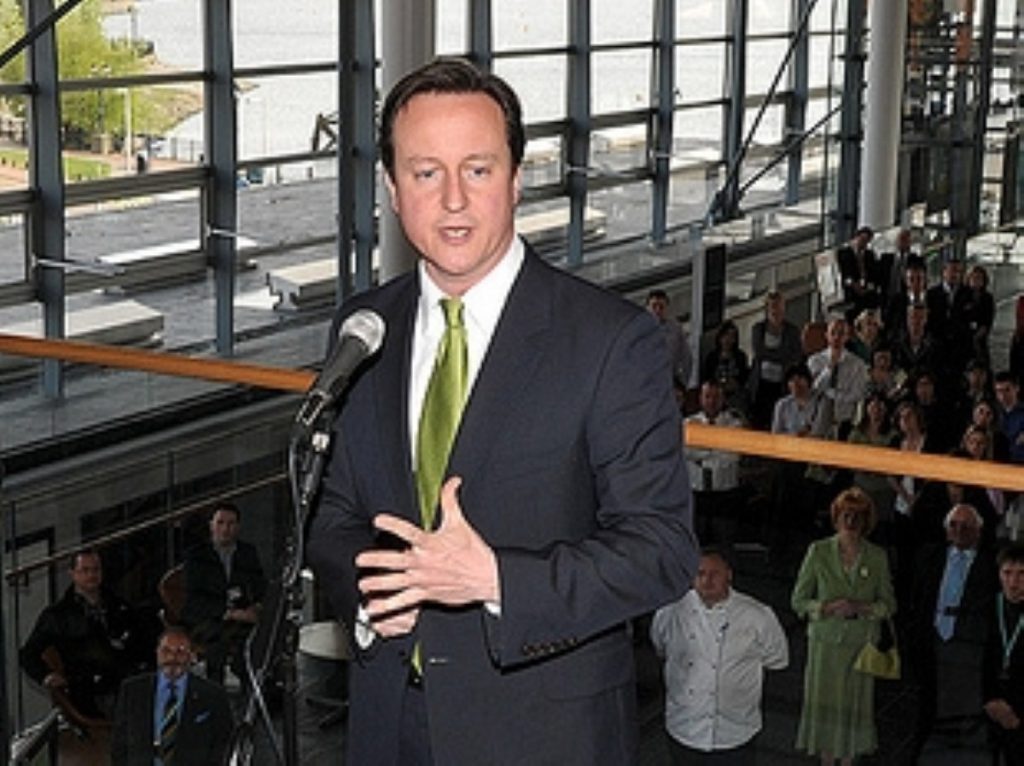Cameron nails his pro-business credentials to the mast
By Ian Dunt
David Cameron has hit back at criticism of the coalition government from his backbenchers with an unashamedly pro-business speech.
In his first speech as prime minister, Mr Cameron made a concerted effort to calm the nerves of anxious backbenchers and party members who are increasingly concerned about the more left-wing policies of his coalition allies.
“Some people have said that our coming together will feature in the history books,” he said of his pact with the Liberal Democrats.


“But I don’t want this to be an historic government because we are a coalition, I want us to be an historic government because of what this coalition achieves. And if we keep to the clarity of this vision, if we stick to this determined plan then I truly believe we can transform our economy.”
Analysis: Cameron turns to the carrot after stick fails
The speech comes as Tory backbenchers grow increasingly rebellious over progressive aspects of the coalition government policy document.
Tory MPs John Redwood and David Davis have both publicly expressed their concerns about a planned rise in capital gains tax – a long-term policy of Lib Dem business secretary Vince Cable.
Both Mr Cameron and Dr Cable were at pains to downplay any conflict in the media yesterday, but the rhetoric of Tory and Lib Dem figures is increasingly at odds.
“People need to calm down a bit and wait for the Budget,” Mr Cameron told GMTV this morning.
The prime minister, who delivered the speech in Yorkshire, cited welfare dependency, red tape, public sector expansion and public spending as causes of concern, in a speech designed to touch on issues close to Tory hearts.
“[Britain] has become over-reliant on welfare, with mass worklessness accepted as a fact of life and around five million people now on out-of-work benefits,” he said.
“It has become increasingly hostile to enterprise, with business investment in the past decade growing at around one per cent each year – only a quarter of what it was the decade before.
“It has become far too dependent on the public sector, with over half of all jobs created in the last ten years associated in some way with public spending.
“And, of course, as a country we have become indebted on an unprecedented scale.”
The capital gains row is possibly the greatest threat to the public unity of the new coalition, with the Lib Dems’ more progressive policies at odds with the views of Tory backbenchers, who have already begun making rebellious noise against the leadership.
“We have been sleepwalking our way to an economy that is unsustainable, unstable, unfair and, frankly, uninspiring,” Mr Cameron said.
“Now that this country is waking up to it, the people of Britain – the people of the world – want to know: can we turn this around?”
Mr Cameron also insisted Tory and Lib Dem ministers were singing from the same hymn sheet.
“If you’re a minister who wants to bring in a new piece of regulation, first you’ve got to find an existing one to get rid of,” the prime minister promised.
“No-one should underestimate how revolutionary this is. For a long time, the whole business of Whitehall has been about creating new regulations. This new rule completely blows that culture apart.
“If the Treasury’s power is about saying ‘no’ to spending, this gives Vince Cable and the Department for Business a new power – in some ways as powerful – to say ‘no’ to regulation.”
Pat McFadden, shadow business secretary, responded: “It is right that we rebalance the economy coming out of the recession but this speech fails to address the announcements made by the government which will make that harder, not easier.”
The money raised by the capital gains policy will contribute to deputy prime minister Nick Clegg’s pledge to raise the income tax threshold to £10,000.









